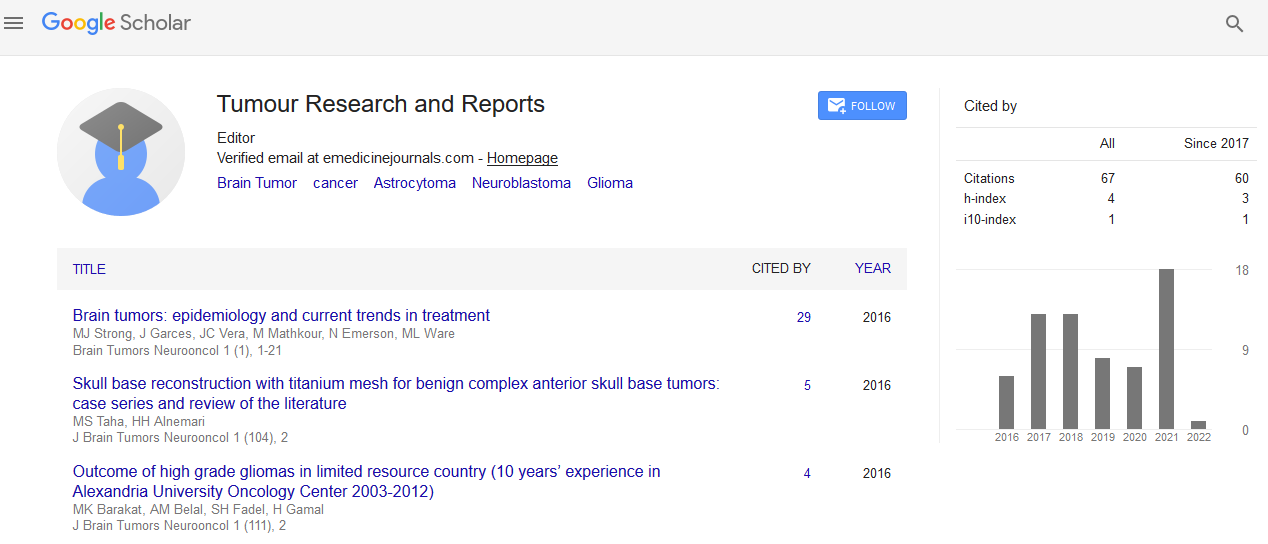Indexed In
- RefSeek
- Hamdard University
- EBSCO A-Z
- Google Scholar
Useful Links
Share This Page
Journal Flyer

Open Access Journals
- Agri and Aquaculture
- Biochemistry
- Bioinformatics & Systems Biology
- Business & Management
- Chemistry
- Clinical Sciences
- Engineering
- Food & Nutrition
- General Science
- Genetics & Molecular Biology
- Immunology & Microbiology
- Medical Sciences
- Neuroscience & Psychology
- Nursing & Health Care
- Pharmaceutical Sciences
Commentary - (2024) Volume 9, Issue 2
Effects of Daytime Sleep on Cognitive Function in Craniopharyngioma Patients: An Integrated Approach
Takaomi Ichihara*Received: 03-Jun-2024, Manuscript No. JTRR-24-25916; Editor assigned: 05-Jun-2024, Pre QC No. JTRR-24-25916 (PQ); Reviewed: 19-Jun-2024, QC No. JTRR-24-25916; Revised: 26-Jun-2024, Manuscript No. JTRR-24-25916 (R); Published: 03-Jul-2024, DOI: 10.35248/2684-1614.24.9.227
Description
Craniopharyngioma is a rare, benign brain tumor that typically arises near the pituitary gland. Although it accounts for a small percentage of all brain tumors, its location can lead to significant complications. One of the less commonly discussed yet impactful symptoms associated with craniopharyngioma increased Efficient Daytime Sleepiness (EDS). This condition can severely affect the quality of life of patients, impacting their cognitive functions, emotional well-being, and daily activities.
Understanding craniopharyngioma
Craniopharyngiomas are slow-growing tumors that primarily affect children and young adults. Despite their benign nature, their proximity to critical brain structures such as the hypothalamus, optic chiasm, and pituitary gland means they can cause a range of neurological and endocrine problems. The hypothalamus, in particular, plays a potential role in regulating sleep-wake cycles, appetite, and energy balance. Therefore, any disruption in this area can significantly affect sleep patterns and circadian rhythms.
Mechanisms behind increased daytime sleepiness
The hypothalamus contains several nuclei that are integral to sleep regulation, including the Suprachiasmatic Nucleus (SCN), which is the body’s primary circadian pacemaker. Damage to the hypothalamus or its surrounding areas due to a craniopharyngioma can disrupt these regulatory mechanisms, leading to abnormalities in sleep patterns.
Hypothalamic dysfunction: The hypothalamus is essential for maintaining wakefulness and regulating sleep. Tumors in this region can cause dysfunction, leading to hypersomnia or increased daytime sleepiness. This dysfunction may arise due to direct tumor compression or postoperative damage following surgical removal of the tumor.
Endocrine imbalances: The hypothalamus and pituitary gland are critical for hormone regulation. Craniopharyngiomas can lead to hormonal imbalances, such as deficiencies in cortisol, thyroid hormones, and growth hormones, all of which are important for normal energy levels and alertness. Hormonal deficiencies can contribute to fatigue and increased sleep needs.
Treatment side effects: Treatments for craniopharyngioma, including surgery and radiation therapy, can further affect hypothalamic function and contribute to sleep disturbances. Post-surgical scarring or radiation-induced damage can exacerbate hypothalamic-pituitary axis dysfunction, leading to chronic sleepiness.
Impact on patients
Increased daytime sleepiness can have extreme effects on the lives of patients with craniopharyngioma. It can interfere with academic performance in children, reduce productivity in adults, and impair overall quality of life. The constant need for sleep can lead to social isolation, as patients may find it difficult to engage in social activities or maintain relationships.
Additionally, EDS can exacerbate cognitive deficits often seen in craniopharyngioma patients. Memory, attention, and executive functions may be further impaired, making it challenging for patients to perform daily tasks. The effect of emotions is also significant, with many patients experiencing frustration, depression, and anxiety due to their constant state of fatigue.
Management strategies
Addressing increased daytime sleepiness in craniopharyngioma patients requires a comprehensive approach that includes medical management, behavioral strategies, and supportive therapies.
Addressing hormonal deficiencies through Hormone Replacement Therapy (HRT) can significantly improve energy levels and reduce daytime sleepiness. This includes supplementation of cortisol, thyroid hormones, and growth hormone as needed.
Stimulants such as modafinil or methylphenidate may be prescribed to promote wakefulness during the day. These medications can help control the effects of EDS and improve cognitive function.
Behavioral and lifestyle interventions
Encouraging good sleep hygiene practices is essential. This includes maintaining a regular sleep schedule, creating a helpful sleep environment, and avoiding caffeine or stimulating activities before bedtime. The short, scheduled naps during the day can help alleviate the need for prolonged daytime sleep and improve overall alertness.
Supportive therapies
CBT can help patients manage the psychological impact of their condition. It can provide strategies to manage the fatigue and improving sleep patterns.
Occupational therapists can work with patients to develop routines and strategies that maximize their energy levels and productivity during the day.
A multidisciplinary approach involving endocrinologists, neurologists, sleep specialists, and psychologists is potential for managing EDS in craniopharyngioma patients. Regular monitoring and adjustments in treatment plans can ensure optimal management of symptoms.
Increased daytime sleepiness in patients with craniopharyngioma is significant but often under-recognized issue that can extremely impact the quality of life. Understanding the underlying mechanisms and implementing a complete management strategy can help control the effects of this condition. Through a combination of medical, behavioral, and supportive interventions, patients can achieve better control over their symptoms and lead more fulfilling lives. Ongoing research and awareness are essential to improve outcomes for these patients and provide them with the comprehensive care they need.
Citation: Ichihara T (2024) Effects of Daytime Sleep on Cognitive Function in Craniopharyngioma Patients: An Integrated Approach. J Tum Res Reports. 9:227.
Copyright: © 2024 Ichihara T. This is an open access article distributed under the terms of the Creative Commons Attribution License, which permits unrestricted use, distribution, and reproduction in any medium, provided the original author and source are credited.

